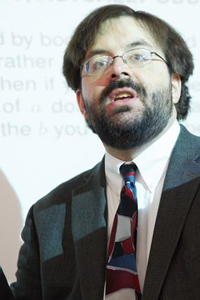Don't see what you're looking for?
Main Site
Berklee.eduCampuses and Schools

Kelly Davidson
Matthew Smith
For media inquiries, please contact Media Relations
Matthew Smith is an assistant professor in the Liberal Arts Department at Berklee College of Music, where he has been teaching courses in mathematics, statistics, acoustics, and logic and programming since 2011. He received a Bachelor of Arts in Mathematics from Northwestern University, a Certificate of Advanced Study in Mathematics from the University of Cambridge, and a Master of Arts in Mathematics and Doctor of Philosophy in Mathematics from the University of Michigan.
Smith is also an enthusiastic amateur pianist, harpsichordist, organist, and violinist, a regular audience member in Boston's concert halls, and has been known to dabble in composition, transcription, and MIDI sequencing.
- Amateur pianist, harpsichordist, organist, and violinist
- Certificate of Advanced Study in Mathematics, University of Cambridge
- B.A., Northwestern University
- M.A., University of Michigan
- Ph.D., University of Michigan
"Being formally trained as a mathematician, I’ve always been very keenly interested in music and in particular in the interplay between mathematics and music, so one of the things I try to emphasize in my teaching style is the fact that mathematics is everywhere you look in music. It’s in such things as instrument design, sound production, the way sounds travel through a room, recording equipment design, recording studio design, concert hall design; even the music on the printed page has a mathematical side to it. I try to emphasize to students that the more they know about the mathematical side of music, the more they can adapt that side to do what they want it to do, to make mathematics and for that matter music work for them."
"The music industry is so much more than just musicians. It’s also the people who write the music, the people who are responsible for making the recordings, the producers and engineers, and the people who are responsible for making sure the money goes where it should after a gig or a tour or an album deal. There are so many different roles to be filled in the music industry, and Berklee can prepare you for all of them. And there is a world-class faculty here as well as world-class students who can help you prepare for any of these career paths."
"It’s possible to appreciate the scientific side of music without losing your appreciation of the fact that it is a form of expression, that it is an art form. That’s something I try to communicate to my students so they don’t see me as some sort of dry scientist who just wants to reduce everything to a bunch of tedious equations. Mathematics isn’t just numbers and formulae and equations, it’s taking things that you know and trying to use those to find out something that you would like to know but do not currently know. I don’t expect to produce a class of mathematicians, but I at least hope that my students appreciate the greater role of mathematics and the ideas underlying it, not just in music but in the wider world."
